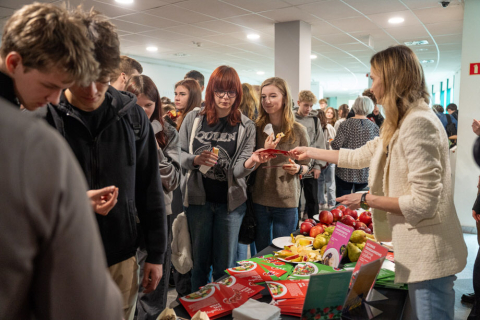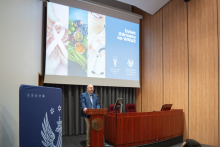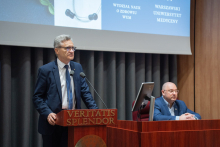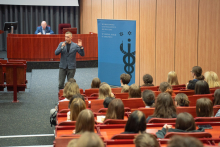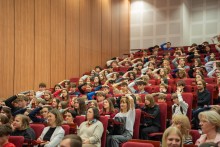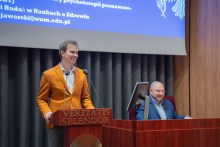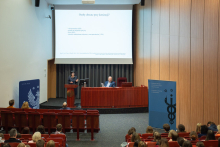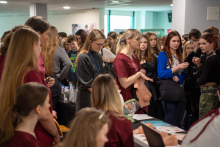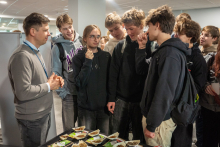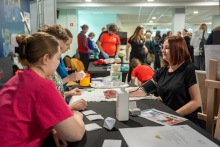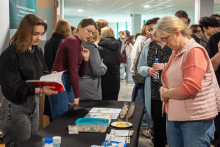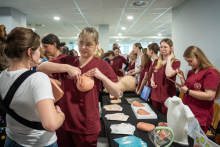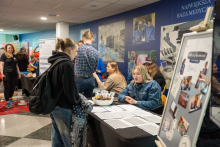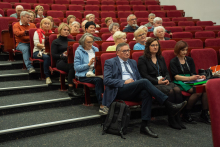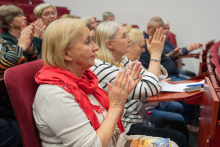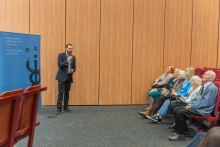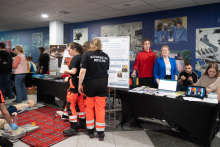Health Day at the Faculty of Health Sciences was held on April 3 at the Teaching Center MUW. The target audience for the first part was students, while the second part was senior citizens. The event was hosted by Prof. Robert Gałązkowski, Vice Dean of the Faculty of Health Sciences. The opening was attended by Prof. Zbigniew Gaciong, Rector of MUW, who took the event under his patronage
Where did the idea come from to organize a Health Day at the Faculty of Health Sciences?
Explains Prof. Robert Gałązkowski: - April 7 is World Health Day, established to commemorate the founding of the World Health Organization in 1948, which is globally concerned with safeguarding human health. The Faculty of Health Sciences reminds us of this important event.
- Health does not just mean the absence of disease - points out Prof. Zbigniew Gaciong, Rector of MUW. - Health is defined as well-being in both physical and mental dimensions, but also, as the World Health Organization emphasizes, a healthy person should have the opportunity to carry out various constructive activities in both the economic and social spheres.
The purpose of Health Day at the Faculty of Health Sciences
Health Day at the Faculty of Health Sciences was primarily educational and informational.
- During the meeting, we will focus on presenting issues - in our opinion as public health specialists - that are key to well-being and a good life - stressed Prof. Robert Gałązkowski.
Thus, the event's program included topics such as oncology prevention, available health programs, and advice on healthy eating, first aid and patient rights, among others.
- Today we are going to talk about what allows you to stay healthy for as long as possible - noted Professor Zbigniew Gaciong and added: - I hope that this time will not be wasted, and that each of you will take something from today's meeting that will be useful in your daily life.
What could high school students hear about?
During the meeting with high school students, a lot of excitement was aroused by a lecture entitled "The dangers of cell phone use," which was given by Andrzej Silczuk, MD, PhD, Head the Department of Environmental Psychiatry.
- I'm holding a phone in my hand - do you feel you are the most important people in this room at the moment? - the teenagers were asked at the beginning by Andrzej Silczuk, MD, PhD.
And then he talked about research on mindfulness, which indicates, among other things, that holding a cell phone in one's hand while talking to another person is sending them a signal that they are not central to that communication.
He checked with students whether they suffer from the so-called "telephone neck" and explained the health consequences of such spinal alignment.
He said that there are currently 6.5 billion registered smartphones in the world. And although - according to the WHO - such addiction does not officially exist, that is - it is not a medical category that can be recognized, the working criteria for addiction to them are met by about 3.8 billion people. The speaker stressed, however, that using the phone alone is not addictive. What is addictive is the content that draws you to the device.
- It's not about not using phones. But it's about making sure this tool doesn't cause harm. This is a matter of prevention. You are the ones who should use your tools, not vice versa/them you - said Andrzej Silczuk, MD, PhD.
What else could the high school students hear about? Mariusz Jaworski, MD, PhD, from the Department of Education and Research in Health Sciences addressed the topic of feeding thoughts and emotions, Dr. Aneta Duda-Zalewska from the Department of Public Health spoke about health programs aimed at students, while Prof. Andrzej Deptała, Head of the Department of Oncology Propedeutics, talked about the European Cancer Code and ways to reduce the risk of malignant cancer. Justyna Teliga-Czajkowska, MD, PhD, from the Department of Obstetrics and Gynecology Didactics talked about cervical cancer prevention and HPV vaccination, and Dr. Ewa Kobos from the Department of Development of Nursing, Social and Medical Sciences talked about which medical facilities to go to for specific tests.
What was discussed during the lecture session for seniors?
Jakub Zachaj from the Department of Emergency Medical Sciences began the lectures for seniors. He discussed in detail the vital signs monitoring tests that can be performed at home, i.e. blood pressure measurement, sugar measurement and saturation measurement. At the outset, the speaker stressed the importance of using reliable sources when searching for health information on the Internet, as well as - consulting an attending physician.
What did the specialist advise? In the case of measuring blood pressure, the test should be performed in a warm room, five minutes after a meal, in a sitting position, with the cuff at heart height, and in the case of a wrist blood pressure monitor, with the hand raised at heart height. When discussing the proper performance of blood glucose, he pointed out that blood should be drawn from the 3rd, 4th or 5th finger, and from the lateral part of the finger. Blood from the finger should not be squeezed, as this can falsify the test results. The skin should be washed beforehand with warm water and soap without alcohol. For the test performed with pulse oximeters, the fingers of the hand must be warmed, the hand must rest calmly, and in addition - there should be no varnish on the fingernail of the finger on which the device is placed.
Dominik Olejniczak, MD, PhD, from the Department of Public Health, talked about health programs that seniors can use to protect their health. Justyna Teliga-Czajkowska, MD, PhD, from the Department of Obstetrics and Gynecology Didactics spoke about mammography screening and breast cancer prevention, Patryk Rzońca, MD, PhD, Head of the Department of Human Anatomy talked about the most common bone injuries, Marzena Walenda from the Physical Education and Sports Centre talked about the important role of physical activity in health prevention, Dr. Ewa Kobos from the Department of Development of Nursing, Social and Medical Sciences talked about diabetes prevention.
Advice and information booths
During the event, students and seniors were able to benefit from a lot of useful information and advice on healthy lifestyles and preventive health care. They were given by members of scientific circles under the guidance of their tutors. At their booths it was possible, among other things, to learn what a healthy plate should consist of, take BIA measurements as well as muscle strength measurements, measure sugar and blood pressure, and learn about patients' rights.
At the booth of the SKN of Medical Rescue, it was possible to learn the principles of first aid in the case of cardiac arrest in an adult, child and infant using an Automated External Defibrillator (AED). Students also demonstrated choking management using the Act Fast vest.
- The high school students were very interested in how to properly administer first aid - says Karolina Kosiacka, supervisor of the SKN of Medical Rescue. - Their level of knowledge varied greatly, from people who were fresh out of Safety Education at school to those who thought CPR is 30 compressions per minute. The seniors mainly asked about how the AED works, but also about helping in cases of choking in a child.
Midwifery students from the SKN of Midwives and SKN of Ethics demonstrated on special phantoms how to properly perform breast self-examination. They emphasized that the high school students mainly asked when they should start examining their breasts and whether changes already appear in women at such a young age. The teachers accompanying them were the most knowledgeable about self-examination.
The Health Day at the Faculty of Health Sciences was attended by the SKN of Clinical Nutrition, SKN of Dietitians, SKN of Human Nutrition, SKN of Midwives, SKN of Ethics, SKN of Medical Rescue, SKN Start from the Basics, SKN of Medical Law, SKN of Public Health of Health Promotion Section.
Who was invited to the Health Day at the Faculty of health Sciences?
The event was attended by:
- Students from XXIV C.K. Norwid High School in Warsaw, CXXXVII R. Schuman High School with Bilingual Branches in Warsaw, Strumienie High School of Sternik Education and Family Support Association, King Jan III Sobieski High School No 2, Emilia Plater High School No. 2 in Piaseczno.
- Seniors from the University of the Third Age of the Retirement Foundation, the Halina Szwarc University of the Third Age, the Nursing Home and the Retirement Home.
Admission to the event was also open to the general public.
